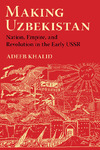Please use this identifier to cite or link to this item:
http://lib.hpu.edu.vn/handle/123456789/28812Full metadata record
| DC Field | Value | Language |
|---|---|---|
| dc.contributor.author | Khalid, Adeeb | en_US |
| dc.date.accessioned | 2018-01-12T07:27:58Z | |
| dc.date.available | 2018-01-12T07:27:58Z | |
| dc.date.issued | 2015 | en_US |
| dc.identifier.isbn | 0801454093 | en_US |
| dc.identifier.isbn | 9780801454097 | en_US |
| dc.identifier.other | HPU4161903 | en_US |
| dc.identifier.uri | https://lib.hpu.edu.vn/handle/123456789/28812 | - |
| dc.description.abstract | In Making Uzbekistan, Adeeb Khalid chronicles the tumultuous history of Central Asia in the age of the Russian revolution. Traumatic upheavals―war, economic collapse, famine―transformed local society and brought new groups to positions of power and authority in Central Asia, just as the new revolutionary state began to create new institutions that redefined the nature of power in the region. This was also a time of hope and ambition in which local actors seized upon the opportunity presented by the revolution to reshape their society. As the intertwined passions of nation and revolution reconfigured the imaginations of Central Asia's intellectuals, the region was remade into national republics, of which Uzbekistan was of central importance. Making use of archival sources from Uzbekistan and Russia as well as the Uzbek- and Tajik-language press and belles lettres of the period, Khalid provides the first coherent account of the political history of the 1920s in Uzbekistan. He explores the complex interaction between Uzbek intellectuals, local Bolsheviks, and Moscow to sketch out the flux of the situation in early-Soviet Central Asia. His focus on the Uzbek intelligentsia allows him to recast our understanding of Soviet nationalities policies. Uzbekistan, he argues, was not a creation of Soviet policies, but a project of the Muslim intelligentsia that emerged in the Soviet context through the interstices of the complex politics of the period. The energies unleashed by the revolution also made possible the golden age of modern culture, as authors experimented with new literary forms and the modern Uzbek language took shape. Making Uzbekistan introduces key texts from this period and argues that what the decade witnessed was nothing short of a cultal revolution. | en_US |
| dc.format.extent | 440 p. | en_US |
| dc.format.mimetype | application/pdf | en_US |
| dc.language.iso | en | en_US |
| dc.publisher | Cornell University Press | en_US |
| dc.subject | Uzbekistan | en_US |
| dc.subject | Nation | en_US |
| dc.subject | Empire | en_US |
| dc.subject | Revolution | en_US |
| dc.subject | Early USSR | en_US |
| dc.title | Making Uzbekistan: Nation, Empire, and Revolution in the Early USSR | en_US |
| dc.type | Book | en_US |
| dc.size | 4.36Mb | en_US |
| dc.department | Sociology | en_US |
| Appears in Collections: | Sociology | |
Files in This Item:
| File | Description | Size | Format | |
|---|---|---|---|---|
| Adeeb-Khalid-Making-Uzbekistan-1888.pdf Restricted Access | 4.47 MB | Adobe PDF |  View/Open Request a copy |
Items in DSpace are protected by copyright, with all rights reserved, unless otherwise indicated.
